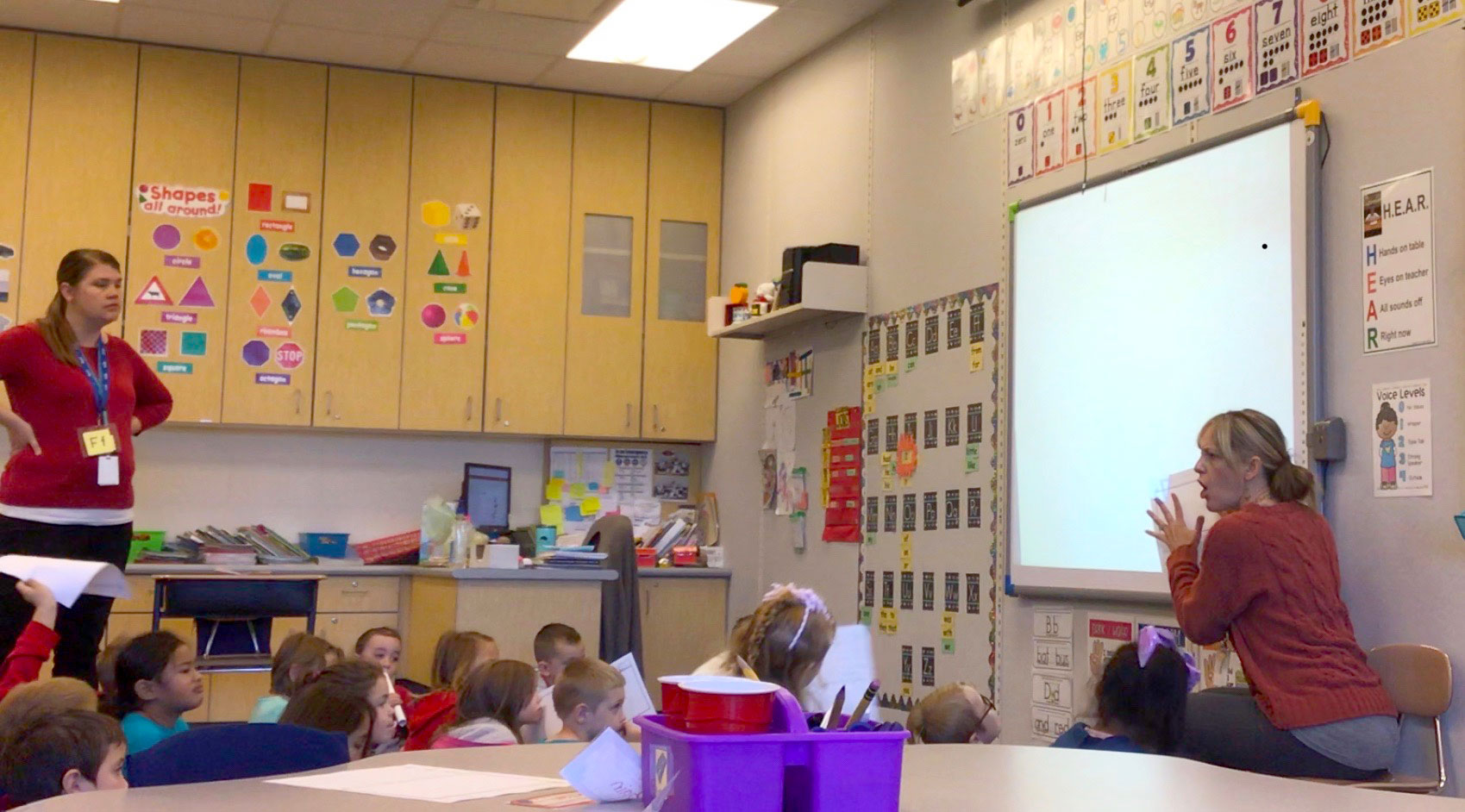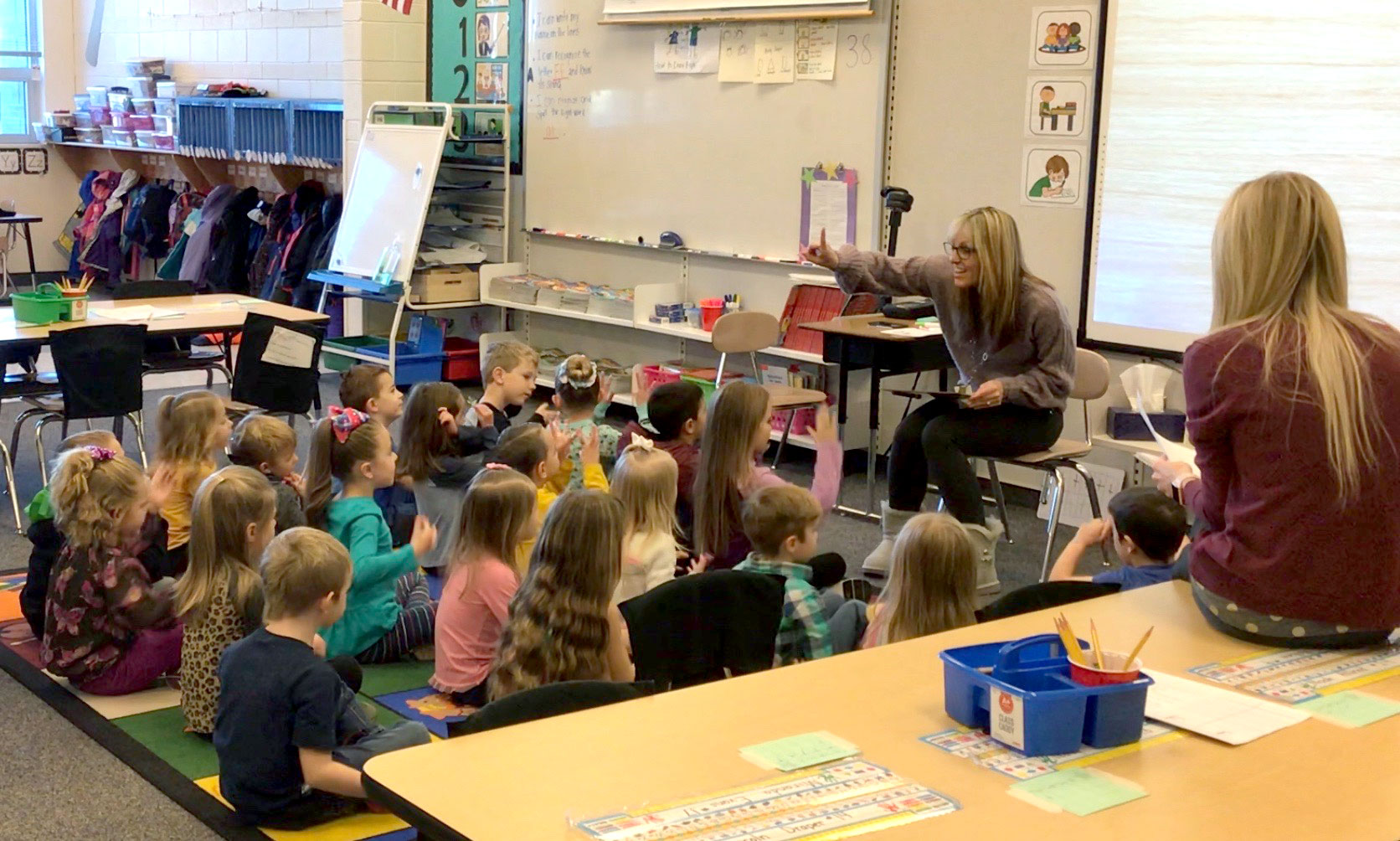Kindergartens in Davis School District achieved 4X the growth of their statewide peers after the teachers received job coaching
There was an underlying concern on the professional learning team at Davis School District two years ago.
“Our struggle was that we didn’t know the impact we were having through traditional professional learning,” said Angie Morales, an Elementary English Language Arts Specialist at the district. “(Teachers would) come to us, learn, and then go back to their classrooms and we couldn’t gauge our impact. We were spending a lot of time on this and just had no idea.”
Kindergarten academic data wasn’t doing well and the then-supervisor and director, Traci Robbins, of the professional learning team proposed a solution – job-embedded coaching in literacy instruction for kindergarten teachers across the district. This would allow teachers of any level to receive immediate feedback and tools for implementation and, hopefully, result in a more positive trajectory for kindergarten literacy performance.
The results were astounding and showed the impact job-embedded coaching can have on early learning outcomes. Utah State Board of Education data showed that:
- The entire district saw a 17% increase in the number of students reaching benchmark literacy performance, compared to only a 9% increase the year before.
- The schools, which fully implemented the coaching, experienced about twice as many kindergarten students achieving typical or better growth than their school district peers and over four times the growth of their state peers.
- 8% MORE kindergarten students achieved benchmark in reading than their peers in the school district and 15% more than their state peers
Currently, there is no specific state investment in ongoing, early learning professional learning. That’s why United Way of Salt Lake is supporting HB 114, Early Learning Training and Assessment Amendments sponsored by Rep. Waldrip.
The bill reinforces that teachers are one of the most important elements of a child’s education and their academic success, and would provide $18 million of ongoing funding to similar job-embedded coaching strategies as Davis School District’s across the state and other teacher supports.
Learn more about the bill here.
How Davis’ job coaching worked:
Implementing such an immersive job-coaching strategy required all hands on deck, Morales said.
The district’s professional learning team expanded immensely, bringing in professionals skilled in literacy instruction to work directly with teachers and participating elementary school’s English/Language Arts Coordinators, who are essentially reading coaches who help create literacy plans and goals for the whole school.
Schools with a pattern of low performance in kindergarten literacy were identified and approached for the voluntary program first. Morales said then leadership of the professional learning team then visited the schools, pitched the project, and after the principal decided to move forward, he or she presents the job coaching opportunity to teachers — a task that took some time to process.
“As we would expect, it’s hard for teachers to have someone come in their room because the mindset through all education is that teachers don’t need help… They are masters of that classroom,” Morales explained. “As we know now, it’s best to have someone to collaborate with, to look at data wit, and open your mind to new things. It’s hard for some teachers to think they aren’t doing a terrible job (when a coach steps in). We see that coaching is for everyone, it doesn’t matter where you are at in your career. We honor these masters and move forward working together.”
About 19 schools participated in the job coaching program. Teachers who opted into the program worked with their school’s reading coach and a professional learning coach – both of whom observed the teacher’s style, offered feedback and support, and also help co-teach new strategies with the classroom teachers.
The coaching support lasted throughout the entire school year, which allowed for teachers to truly absorb and implement the strategies that would fit their classroom best. Heather Gross, the ELA Supervisor for the district, said the secret sauce to making this strategy work was the relationships built between the teachers and the coaches.
“Through this program, we are trying really hard to be responsive…There are some schools where we exit earlier and other schools that need more hours of instruction and coaching,” Gross said. “That funding allows us to be responsive to the emotional feedback from teachers and the data regarding student growth and proficiency.”
How state funding would impact the program

The first year of the district’s literacy job coaching by all counts was a huge success.
To build upon that, Gross said their team decided to expand the same model to first grade teachers. They used similar criteria as they did the first year.
If the legislature passed HB 114, the opportunities available for growth and expansion would move well beyond moving into working with just kindergarten and first grade teachers. Morales and Gross both said the prospect of those dollars being put toward a similar numeracy and math professional learning cycle would be amazing. Also, the chance to be able to focus on any teacher who wants to be coached, not just teacher identified based on their student’s performance, would be a game changer.
“With this funding, if we need to make adjustments to increase help to another school then we can,” Gross said. “We don’t have to choose which fire is burning the brightest. We can address everything and be able to support everyone in different ways.”
The relationships developed over the course of the coaching cycles with teachers and coaches have truly shown the longevity behind why this approach works, Morales added. When teachers and coaches come together with the understanding that they both want the same outcome – more students empowered to learn and succeeding in their education – that makes all the difference.
“We have huge goals and at the heart of them is for kids to be able to access text well and be able to read and write,” she said. “Those are huge steps (in a kid’s education). Teachers do so many beautiful things so supporting them in one piece of that hard work is truly our mission”
Join us in supporting HB114, Early Learning Training and Assessment Amendments. Sign up to receive our action alerts at uw.org/action to learn how to help.
By Kelly Schmidt, Content Manager at United Way of Salt Lake



